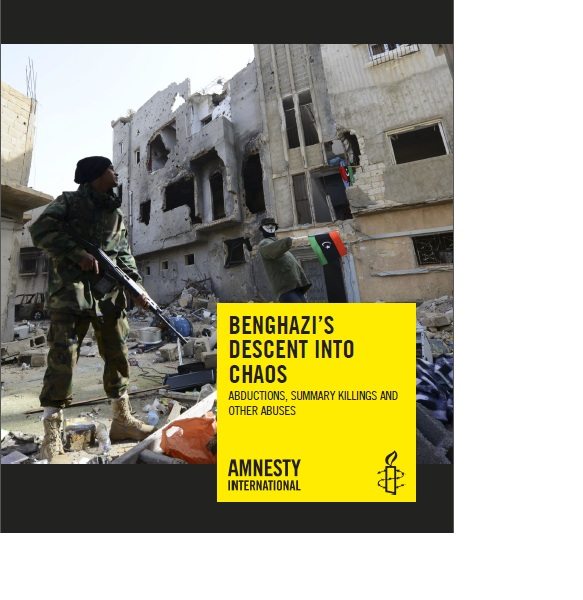Targeted UN sanctions and accountability, including through the International Criminal Court (ICC), are urgently needed to end rampant abductions, torture, summary killings and other abuses by rival forces in Libya, some of which amount to war crimes.
Benghazi’s Descent into Chaos: Abductions, Summary Killings and Other Abuses sheds light on a series of gruesome abuses carried out by fighters from both the Shura Council of Benghazi Revolutionaries (SCBR), a coalition of Islamist militias and armed groups, and forces loyal to General Khalifa Haftar’s Operation Dignity campaign, since May 2014.
Amnesty International is calling on the UN Security Council (UNSC) to impose targeted sanctions including travel bans and asset freezes against those involved in the violation of human rights or international humanitarian law as per resolution 2174 adopted in August 2014.
The organization is also urging the ICC, which has jurisdiction over war crimes and crimes against humanity perpetrated in Libya, to expand its investigations to incorporate war crimes and crimes under international law committed by all armed groups and militias since February 2011. So far the ICC has only investigated crimes committed during the 2011 uprising and armed conflict.
In recent weeks ongoing UN talks in Geneva have offered a glimmer of hope that Libyans may be able to pull the country back from the brink.
Nearly four years after the Libyan people rose up against Colonel Muammar al-Gaddafi, much of their hopes for a stable future have been shattered.
Amnesty International’s briefing unpicks the complex web of armed groups behind the wave of violence that has gripped Benghazi in recent months.
Gruesome details have emerged indicating that forces on both sides have abducted and summarily killed scores of individuals – with photos and videos of their dumped bodies, often bearing marks of torture, later appearing on social media.
In other cases activists, religious leaders and journalists have been assassinated in politically motivated attacks. Perpetrators remain unknown but many in Benghazi blame groups affiliated with SCBR forces, in particular Ansar al-Shari’a.
Under the banner of fighting terrorism and reinstating the rule of law, Operation Dignity forces launched an operation to retake Benghazi from SCBR forces on October, 15 2014.
Three months of intense fighting and indiscriminate shelling in residential areas, in addition to airstrikes by Operation Dignity forces, have caused extensive damage to some areas, in particular those around the commercial port and the city centre such as al-Sabri. Scores of homes of individuals perceived to be affiliated with Islamist groups have been looted, vandalized, set on fire and in some case bulldozed to the ground.
The humanitarian consequences have been dire. At least 90,000 people have been displaced by the fighting. Civilians are struggling to cope with a lack of water, rising food prices, severe power cuts and shortages in cooking gas and fuel. The fighting has also caused shortages of medical supplies and staff in public hospitals. Some hospitals were evacuated after being hit by shelling. All schools have effectively remained closed.
Abductions and summary killings
More than 260 people – civilians and fighters -went missing in Benghazi between June and November 2014 according to the Libyan Red Crescent Society (LRCS).
Many abductions have been carried out by groups affiliated with the SCBR. In most cases they were seized from their homes or in the streets by masked gunmen. Medical workers have also been targeted, often in order to treat wounded SCBR forces at field hospitals.
Operation Dignity forces have also captured, tortured and summarily killed fighters and civilians. Some were detained after being accused on social media sites of belonging to Islamist armed groups.
Many families only discovered that their relatives had been killed after identifying their dead bodies in photographs and videos posted on Facebook.
In al-Marj, a town located approximately 90 km east of Benghazi, at least 17 photos of unidentified bodies dumped in the area were posted on social media sites. Amnesty International found evidence that at least four of these men were summarily killed following their detention by Operation Dignity forces in al-Bayda.
The sister of one victim, Anas al-Khitab, described to Amnesty International how another brother had seen a photo of their brother’s dead body on Facebook alongside four others.
“A forensics report states that Anas was killed by a bullet shot in his head, but did not mention any marks of torture. My brother who is a doctor saw bruises on Anas’ body suggesting that he was beaten,” she said.

